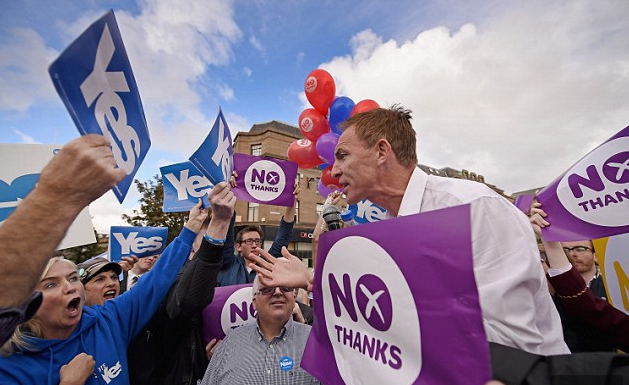While distributing free Spectators in Glasgow yesterday, I came across a Labour rally and ended up standing about two metres away from Ed Miliband as he gave his speech. But no one could hear a word he said because the ‘yes’ crowd were eyeballing him, chanting and looking as if they were about to eat him. Compare this to the serenity with which Alex Salmond makes all of his speeches: where are the ‘no’ heavies shouting him down? They don’t exist: you may get the odd heckler, but the tactics deployed by the two sides are fundamentally different.
This underscores an important point, a trademark of this campaign: how the ‘yes’ side mastered mob politics. What went on yesterday is summed up by the superb Michael Deacon:
An aide handed him Miliband microphone. He looked out at the barracking throng of Yessers. “Friends!” he began, brightly. “You’re no friend ae mine!” bawled a Yesser. “You’re a traitor, so you are!” bawled another. It was a blitz of abuse. “Red Tories! A parcel of rogues! You don’t belong up here, Miliband! You don’t have a vote! You’re no’ even Scottish!”
Gamely, but inaudibly, Mr Miliband plodded on with his speech.
At the front of the Yessers, a shaven-headed man in a hooded top was near-delirious with glee. “Slaves!” he hooted at the Labour MPs, his voice a grotesque parody of a black slave from the American Deep South. “Uncle Toms! No thank you, massuh! Just tell us where ah sign mah expenses form, massuh! I is a good white nigger!”
Jim Murphy, one of the leading figures of the No campaign, glared at him stonily. “Go on, then!” jeered the skinhead. “If you’re no’ a slave, what are you?”
“We’re patriots,” growled Mr Murphy.
This is the first time I’ve seen, in print, a phrase I’ve heard a lot of: “Uncle Tom.” I’ve been called an ‘Uncle Tam’ before – a name these psychos give to Scots who they believe collaborate with the colonial masters. Especially the those whose accents are moulded by 20 years in their adopted home.
I had the pleasure of meeting a ‘yes’ thug yesterday. He tried to get in the way of my distributing the Spectator by standing in front of me and telling me how much he disliked it, and moving when I moved. I imagine his idea was to give me an ear-bashing until I turned heel. When I spoke to a passer by, he’d come up and stand with us and interrupt the conversation. When I started talking to a lovely, elderly ‘no’ voter he came up to us and remonstrated with her. ‘This is how they behave’ she told me: she asked him to leave, he wouldn’t and stood there smoking a roll-up in front of her. He only left when I started to record the conversation, called me an “English person invading”. I took exception to English, she took exception to ‘invading’. Here’s the recording:-
The lady told me afterwards that fear of such people stops her being more active in the 'no' side. I wouldn't put up a 'no thanks' sticker," she tells me. "I know its cowardly." It's not cowardly, it's quite rational. This tactic is effective for the 'yes' side - all you need is one person to spread enough fear, and pensioners like the lovely women I spoke to won’t dare display ‘no’ literature.

A 'yes' activist confronts a woman at yesterday's 'no' rally (Photo: Daniel Jackson)
The art of 'black ops' has always been part of political operations. But there is more of it in Scotland, on a scale you just don't see in general elections. The same mob behaviour has dogged Labour’s Jim Murphy (who deserves a knighthood for his tireless campaigning). He doesn’t advertise his stump speeches, and they go well for the first 20 minutes until the ‘yes’ team get wind of him, and mobilise. Then start to hurl abuse at him (see picture at the top).
This does work: you inhibit your enemy, you discourage them from going to the stumps. You need Jim Murphy's courage and energy to do 100 stump speeches: any other Labour MP would think twice about facing down these thugs. But this is an example of the dark side of nationalism - any kind of nationalism: Salmond doesn't dictate it, but nor can he control it.
The overwhelming mood I felt in Glasgow was one of excitement and optimism. But there is fear, too. And that's due to the darker fringes of the 'yes' campaign, who have proven that they do mob rule far better than their rivals.







Comments